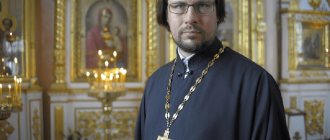The loss of a loved one is pain and sorrow. We desperately think how little we have done for the deceased. I want to return time and correct mistakes, pay more attention to those who are no longer around. It is not surprising that we try to take care of the dead in the next world.
The Orthodox Church has an established tradition of performing funeral services for the deceased. But what to do if an unbaptized person died? Is it possible to leave him without this seemingly obligatory procedure?
And even if a funeral service cannot be performed voluntarily for an unbaptized person, then what about dead babies? They had no choice.
The question of funerals immediately arises: how to deal with them, is a cross needed? Is it possible to pray for an unbaptized person?
Let’s summarize all this like this: does the Orthodox Church allow rituals for the unbaptized dead? Let's start to figure it out in order.
Unbaptized children are buried without Orthodox ritual, God has his own relationship with them
The Russian Orthodox Church strictly approaches the question of how to bury an unbaptized person, even a small one. They are not buried according to the Orthodox rite.
There are no exceptions. It happens that a child dies in the womb or just before being born. He simply did not have time or was physically unable to baptize him.
Some believers ask if it is the child’s fault that he did not have time to undergo the sacrament of baptism. Is it fair to deprive him of standard funeral procedures for Orthodoxy?
Fair enough, because he is not a member of the church. I didn’t have time to join it. But God sees and knows everything. He is fair and will not deprive unbaptized infants of posthumous benefits.
Since they died so early, it means that the Almighty had reasons for this. And they certainly don’t need some kind of “pass” from earth to the Kingdom of God.
Funerals of unbaptized children and adults differ from ordinary ones in the absence of prayers and attributes of Orthodoxy.
There is no need to look for workarounds to retroactively baptize a child. This is not only useless, but also pointless. It is enough to hold an ordinary funeral - with ablution, farewell, but without the involvement of a priest, candles, reading prayers and other things.
Just a coffin and people who want to say goodbye. There is nothing harmful to the child’s soul in this.
28 weeks
Until this date, the funeral of babies is carried out by a medical institution
It is also worth mentioning that often funerals of unbaptized infants are not necessary. We are talking about those who died inside the womb. If the period has not reached 28 weeks, then the bodies are taken care of by a medical institution. Well, the Lord will take care of the soul.
Attempts at posthumous infant baptism
The Orthodox Church unconditionally condemns this kind of fabrication. Equally criticized are attempts to baptize an already deceased child in church or at home, tempting the priest with a generous reward. All kinds of folk methods of helping an unbaptized child’s soul enter the gates of heaven are also absolutely unacceptable. These, in addition to various conspiracies, include manipulations with crosses on the body, practiced during the funeral of three or more children, divination over eggs painted in a special way, etc.
A funeral service without baptism is impossible, because Orthodox rites cannot be performed on those who are not baptized.
There is no funeral service without baptism. But this is not because unbaptized people are somehow contrary to Orthodoxy. There is no need to perceive this as saying that a person died without faith, so it serves him right, we won’t perform a funeral service.
The Russian Orthodox Church simply does not have the right to conduct any rituals over an unbaptized person.
After all, not only the funeral service, but other rituals and sacraments are not allowed to be performed with the unbaptized. By being baptized, a person entrusts himself to the church, saying that from now on it is responsible for his soul.
Of course, when one is baptized in infancy, there is no talk of any conscious choice. But this is done in order to take the person’s soul under guardianship in advance.
He is free to accept this gift or refuse it in the future. But at an early age it is useful to have something that protects you.
The funeral rite - it can only be performed on a baptized Orthodox person
A person who has not joined the church through baptism has not given it authority to do anything to save his soul. But one of the main gifts of the Lord is freedom of choice.
And who are we if we want to challenge this right? So is it possible to perform a funeral service for an unbaptized person, since he himself shunned the church? No, this is an act against the will, and therefore against God.
Funeral service
this is a request to the Almighty to forgive the sins of the deceased
This ritual must occur after the life of every person who is baptized and has not renounced Orthodoxy. The Church serves as a mediator. Baptism is a kind of power of attorney for her. That is why the word is “faith”.
And if a person has not recognized such a right, then he already has his own personal relationship with God. This will all be decided at a different level and not by the church. So the funeral service becomes a meaningless and even insulting ritual to the Lord.
In this case, we seem to say: “So what if the deceased did not allow us to ask for himself. We’ll decide everything for him now anyway.”
And, of course, the request of some parishioners to the priests looks completely absurd: “You first baptize our deceased, and then sing.” It doesn't happen that way.
Prayer for the unbaptized departed to the Lord God Jesus Christ
The truth is that often people who have firmly decided to be baptized, or who have been baptized but decide to begin a spiritual life, are attacked by demons. This is expressed in a bad mood and irritability, sudden irritability in loved ones, and transport breakdowns. These are real actions of dark spirits. Do not be afraid in any case: you are on the right path, and they are only trying to prevent you from coming under the protection of the Lord.
“O Lord and our God, do not forget Your servant (name) who died in faith and hope for eternal life. You are the Good and Loving Lord of all people, you forgive sins and destroy lies, forgive and forget all his sins and mistakes, accidental and intentional, deliver him from eternal torment and hellish flames, give him the sacrament and joy of Your eternal joys prepared for everyone, those who love you. Even if he sinned, he did not depart from You, he believed without doubt in the Father, the Son and the Holy Spirit, the Holy Trinity, You, the Lord in the Holy Trinity, the One and Glorified, and until his last breath he confessed the Holy Trinity Orthodoxy. Be merciful to him, reward him at least for faith instead of works, rest with all Your saints, as a Generous God: after all, there is no person who has lived life and not sinned. You, Lord, he is Sinless, Your righteousness is the Truth in all ages, only You are the God of mercy and generosity, May we all, living and dead, give eternal glory to You, the Father, the Son and the Holy Spirit. Amen".
It makes no sense to put a cross on the grave of the unbaptized; this attribute will not help in the next world.
The situation is slightly different with the question of whether it is possible to put a cross on the grave of an unbaptized person. If an Orthodox priest must refuse a request to perform a funeral service, then he has no power to influence the design of the tombstone. So the question should hardly sound like “is it possible.”
“Everything is possible for me, but not everything is useful,” says the Christian truth.
Rather, it is worth asking whether this makes sense.
If the relatives of the deceased think that in this way they will help the unbaptized in the next world, then they should not even try. The Lord really doesn’t care whether a golden cross is erected over the grave. This will not affect the posthumous fate in any way.
Higher powers do not obey candles, crosses and prayers. They cannot be manipulated through rituals.
For many, a cross is an obligatory attribute of the grave. Otherwise it looks somehow unfinished. Tradition after all. This is a thoughtless approach, but the church cannot ban it.
A cross on a grave is a sign of an Orthodox Christian; everyone else has no use for it
However, some priests offer an alternative. Still, the cross is a sacred symbol. It would be more correct not to use it, but to depict it with engraving.
It seems that the “tradition” has been preserved, but at the same time this is not the cross itself, not what is placed on the grave of Orthodox Christians.
And if a person did not accept Orthodoxy during his lifetime, will he be grateful for the cross? After all, this is against his will.
In reality, the cross is often not only for the unbaptized, but even for the baptized. It is not enough to undergo the first sacrament to become an Orthodox Christian. To do this, you also need to do something.
And formalities do not bring a person closer to God. If all you did spiritually was to be baptized, light three candles and finish everything under the cross, then this is empty in the eyes of the Lord.
You can only pray for the unbaptized at home, but not in church
If a person is not baptized, then prayer in church will not affect his fate in any way.
Metropolitan Macarius (Bulgakov) wrote:
“Our prayers can act directly on the souls of the deceased,
if only they died in the right faith and with true repentance,
those. in communion with the Church and with the Lord Jesus:
because in this case,
despite the apparent distance from us,
they continue to belong with us to the same body of Christ.”
Macarius (Bulgakov)
metropolitan
St. Augustine is even more categorical:
“There should not be any doubt that the prayers of St. Churches, saving sacrifices and alms benefit the dead, but only those who lived before death in such a way that after death all this could be useful to them.
For those who have departed without faith, promoted by love, and without communion in the sacraments, the works of that piety performed by their neighbors in vain,
which guarantee they did not have in themselves when they were here, not accepting or accepting in vain the grace of God and hoarding for themselves not mercy, but wrath.
So, they do not acquire new merits for the dead when those they know do something good for them, but only draw consequences from the principles they previously laid down.”
St. Augustine
theologian
And yet you can pray for an unbaptized person, but not in church. It is acceptable for relatives to read prayers at home and light candles, but no more. No proskomedia, memorial services, etc.
New Martyr Athanasius (Sakharov), Bishop of Kovrov, in his work “On the Commemoration of the Dead According to the Charter of the Orthodox Church” writes:
“At home prayer, with the blessing of the spiritual father, even those who
who should not be remembered at a church service.”
“Remembrance of the departed, out of humility and for obedience to the Holy Church,
transferred to our home cell prayer,
will be more valuable in the eyes of God and more joyful for the departed,
than what was done in the temple,
but with violation and disregard of the Church statutes.”
Afanasy (Sakharov)
bishop
At the same time, there is no unanimity in Orthodoxy as to whether it is possible to remember the dead with some kind of church prayer. For example, the Venerable Elder Leo of Optina proposed the following:
“Seek, O Lord, the lost soul of my father: if it is possible, have mercy. Your destinies are unsearchable. Do not make this my prayer a sin, but Thy holy will be done.”
Today they often offer to pray for the unbaptized martyr Uara. This causes a lot of controversy. In Christian circles there are both supporters and critics of this idea. Perhaps in the future the church will form a clearer position.
This prayer is worth seeking a blessing from a priest. If he blesses you, feel free to read it. But the martyr Uara is not recommended to pray for the deceased without a blessing. It’s better to come up with your own prayer then.
They pray to the Martyr Uar for the unbaptized, but only at home, it is prohibited in the temple
Troparion, tone 4:
Through the army of the saints, the passion-bearer who suffered legally, in vain, you showed your strength courageously. And having rushed to the passion of your will, and to die lustfully for Christ, who have accepted the honor of the victory of your suffering, Ouare, pray for our souls to be saved.
Kontakion, tone 4:
Having followed Christ, the martyr Uare, having drunk His cup, and having been bound with the crown of torment, and rejoicing with the Angels, pray unceasingly for our souls
Prayer:
Oh, venerable holy martyr Uare, we inflame with zeal for the Lord Christ,
You confessed the Heavenly King before the tormentor,
and you suffered zealously for Him, and now stand before Him with the angels,
and rejoice in the highest, and see clearly the Holy Trinity,
and enjoy the light of the Beginning Radiance,
remember also our relatives’ yearning,
those who died in wickedness, accept our petition,
and like Cleopatra, you freed the unfaithful race from eternal torment with your prayers,
So remember the trees buried against God,
those who died unbaptized,
trying to ask for deliverance from eternal darkness,
Let us all praise the Most Merciful Creator with one mouth and one heart forever and ever. Amen.
How to help the soul of an unbaptized person to rest
For unbaptized people who died without a funeral service, notes cannot be submitted or prayers offered at the Divine Liturgy, since they were not members of the Church. Orthodox Christians can ask the Lord for mercy for the departed at home prayers in front of icons.
If a person during his lifetime led a decent lifestyle that corresponds to holy scripture, God will not leave him. Relatives can only leave the further posthumous fate of the deceased to be decided by God. Prayers for people who died without Baptism can be offered at any time of the day.
Representatives of other religions, even Catholics, are not remembered or held funeral services by the Orthodox Church
The same rule applies to Catholics, Protestants and other representatives of various Christian denominations - they cannot be commemorated in Orthodoxy. Yes, a Catholic is a Christian. But he is not an Orthodox Christian.
Accordingly, the Orthodox Church has no authority over his soul.
Therefore, exactly the same rules apply to atheists, Muslims, Catholics and representatives of all possible religions as to other people who have not been baptized in Orthodoxy.
By leaving a comment, you accept the user agreement










